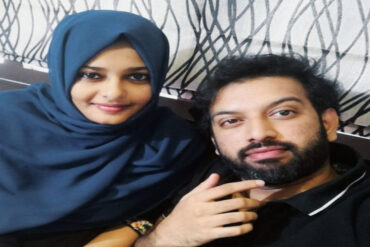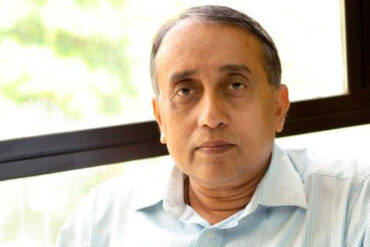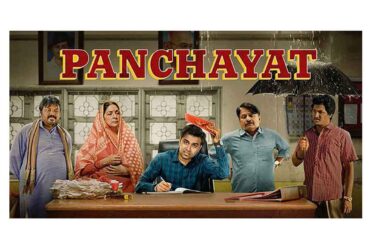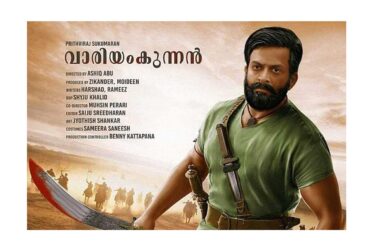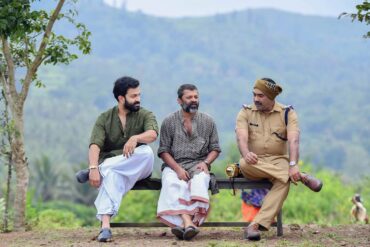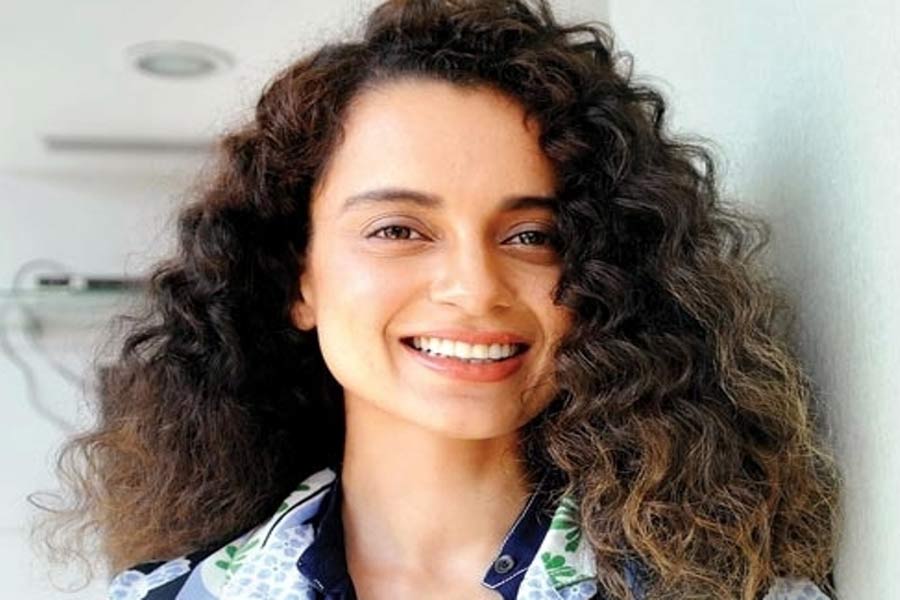Kangana Ranaut has been in the news for various controversies, but in this conversation, we focused on what acting means to her. She discusses actors and directors, good, bad and indifferent, as well as her penchant for speaking her mind and not caring about who she offends. In a room full of film aspirants, Kangana talks about what she’s done to better her craft, how she has managed to bounce back from failures, and a backup plan if her movie career fails. Her films reveal her as an artist with boundless ambition, and I am excited to see what she creates next.
(Excerpts of the conversation with Kangana Ranaut…)
Anupama Chopra (AC): Kangana, since we last spoke, you have been mired in controversies. There is a writer who says you have stolen his film, there is a director who says you have stolen his…umm… film, again, then there is nepotism which keeps going on, and then there is, of course, the whole Hrithik Roshan thing, but I don’t want to talk about any of that.
KR: Thank you. (Kangana bows to Anupama, and everyone laughs.)
AC: What I want to know is how, as an actor, you can disconnect from all the sound and fury and just focus on honing your craft.
KR: I think, guys, you all are from a film or drama school, which I haven’t been to. I have met some incredible actors over the years, and from them I have learnt the exercises they did in school. Piyush Mishra told me how important yoga was for actors. It sounds a bit lame to say meditation is very important to stay focused and to have clarity of mind. Maybe there’s a controversy and people know about it, but something or the other will always be imbalanced (in life). So, I rely a lot on meditation and so do some of my friends who are theatre actors and come from drama school. I myself have done theatre, and my exercises are mostly yoga, but ‘dhyaan’ (meditation) is a very important part of it. I mean it’s called ‘dhyaan’ for a reason. So you have to concentrate, and it is projected onto what you want it to be projected on. It is very easy. Especially for actors. What is acting? Acting is meant to build your impulses and your emotions to arouse yourself to a situation, unnaturally. It is not natural. If you want to cry, you have to be in an environment that will make you cry like a normal human being, but as an actor, you have to create an imaginary environment to cry, to arouse yourself and stimulate your senses to be able to get to that level of emotion. Over a period of time, what happens is that unnatural stimulation causes a lot of emotional, very abrupt…what do you call it…meltdowns!
If you are happy, you will go sad, if you are sad you suddenly feel happy. If you are an ‘aware’ person then you will know that it is because of acting. If you are in a van right now, you have to jump out of the van, and then do a laughing scene…what will you do? You will make yourself happy, you will start to jump and think of all the things that make you happy or you do this for sadness. Your mother is dying, or something. So, there is so much (happening) and you stimulate your mind so much that you start to feel a bit emotionally unhealthy. I think actors get a lot more emotional than most people, and the more they act, the more emotional they become as people. That is why a lot of them are twisted…(smiles) in reality and sometimes enter very doomed kind of circumstances and have an unhealthy emotional life. So, what can happen with controversies and even in your personal life is that things might affect you either not at all or in an exceptionally extraordinary way.
AC: I know you are not on social media, but do you, when you are in the middle of a role, let’s say, while creating a role like Simran, disconnect from reading about yourself?
KR: Ideally I should be disconnected all through the filming process, but sometimes you cannot afford that. But what is very important for me and very crucial are the initial few days when I am tapping into the character. Sometimes when you are getting into the character and trying to discover her, it needs a lot of concentration, and you cannot afford to have your concentration diverted anywhere else. The quickest I have done it is with Datto (the name of the character from Tanu Weds Manu Returns); I think it took me around ten days to get into that character. Then it was like, ‘Oh! I have her now’, and the longest time has been with Manikarnika: The Queen of Jhansi. So, yeah, as long as it takes! So, if it took me, say, two days, then yes, post that I can be myself. I can search myself on Google and see what’s going on.
AC: Kangana, I was talking to Nawazuddin about how he creates his characters, and he told me how he actually takes things from his own life. So, the scene in Gangs of Wasseypur II where he is asking Huma Qureshi’s permission to have sex with her was actually an instance from his own life. Now that you are co-creating your characters in a very proactive way, is there a part of you in Simran, or Rani or Datto?
KR: As an actress, as a performer, yes, there is a part of my personality in these girls. And in terms of thought, there is something that I feel strongly about. With Simran, I felt it was the story of a girl who wanted to be rich, but I, on purpose, pushed her anger into a role…this particular role…this woman’s. Simran became a person who enjoys having sex, because I felt it is important for our nation to come to terms with the fact that a woman also wants to have sex.
AC: Oh no! Who knew!
KR: So, I felt, with my own personal experiences of our society, it necessary to put it out there that it’s perfectly healthy and normal for a woman to want to have sex, especially for those who are sexually active. So, she doesn’t find shame, and this is something I forced (into the script). She doesn’t find shame in picking up boys; she is single, she has dated many men, and she is just divorced. She has dated many men, and she takes pride in that. There is nothing wrong in that, and so, I think it comes from my concern for my surroundings, and this has been quite a concern. Even with all the talk about women empowerment and feminism, we are not able to give our women respect and a certain comfort with their sexuality. For example, when I was hurt in Manikarnika: The Queen of Jhansi by a sword during a sequence, a lot of people from my crew came up to me when I was bleeding. Apparently, I was very brave in the way I dealt with it, so they came up to me and started saying… ‘Oh, you got balls, you got balls,’ and I said, ‘No, I don’t have balls.’
AC: (laughing) The last time I checked…
KR: (laughing) I have a vagina. Why can’t you say that word? Why is ‘balls’ easier to say than vagina or ovaries? It’s so cool to say ‘I have ovaries!’ So I think it has been taken away from us. Our sexuality has been taken away from us. Same goes for ‘pussy’ or ‘sissy’. It is associated with cowardice. Women are associated with cowardice. I think that is horrible. You can carry a human being in your vagina, so how can it be a sign of weakness? So, there is a lot of brainwashing, and I want us to be free of that. We should go beyond all this now. To consistently talk about equality for me, in my thirties, is becoming embarrassing. I mean, of course we are equal!
AC: Coming back to Simran, you said in an interview, that when Hansal (Mehta) came to you with that project, you said that you didn’t want to have a director-actor relationship; you wanted to be a partner. But, Kangana, even the most talented, most successful actors in Hindi cinema, you know, Aamir Khan, and Shah Rukh Khan, talk about submitting to the vision of the director, while you say you are fed up of taking directions. So, how does your relationship with the director work?
KR: I am fed up of taking directions from egomaniacs because it doesn’t come with…I mean…I would love to be under the supervision of somebody who gives me a sense of being equal. Just taking instructions from someone doesn’t mean that they can be dictators. I feel, with direction, there is a lot of confusion. Most people tend to be dictators. Like, I remember this director who would come every morning and say… ‘Then I want you to… in this line look down…this line look up…this line you exit…’ You can’t tell me how to act, because I am an actor. You can tell me to do something else, like ask me to interpret it differently. The best directors that I have worked with say, ‘Thoda ek notch higher kar do (Take it a notch higher)’ or ‘Thoda kam (Tone it down)’. This is the best direction you can give to an actor. You can’t tell an actor to mimic you. Another director I worked with told me, ‘Look, anything that you want to do with your character, tell me in the van. Don’t talk to me in front of the crew. The crew respects me.’
So if I want to tell my director something about my character, like I want this line extra or maybe I am sitting here on a chair and saying this…we should see how it works. So, I can’t have this conversation with my director. Apparently, it is hurting his male ego. But honestly, I prefer this one to those who have hostile impulses and release them on actors at the wrong time and wrong place. This is much clearer and nicer. It is (like saying), ‘Hey, it really hurts to know that you also have a mind of your own, but can you sit in your van and I will come to your van everyday…?’
AC: For all of us, we come to some position of autonomy after working our butts off for years and years. It has taken you eleven years to now say, ‘Let’s not shoot for a year; let’s wait till this script is in place.’ But it’s going to take everybody here a while to get there, right? So, when you are in a position where you can’t call the shots, what is it that you focus on to keep going?
KR: To be honest, it is not going to be that difficult if you can’t call the shots. It’s not that you feel, ‘Oh my God! I want to take control or I want to take charge.’ It’s only when you start to realize that your brand is so big that it is bigger than the film, and the director and the producer. The only person who is getting bashed is you! That’s when you feel, ‘I didn’t take any of these decisions.’ Then there is no one you can complain to because the one who is getting all the gaali and joota (abuses) is you, and the one whose brand is coming down is yours. That’s when you begin to realize that if you did not take the call, too bad for you. Why didn’t you? You can’t keep going to your mamma and papa. When I was a relatively smaller actor during Fashion or Metro, it was a glorious time for me. You go to the sets, do your bit, the film is a flop, but you still keep getting jobs. I don’t think that the time was suffocating. It only got worse when my name became bigger than the film; then it became a bit of a tricky business. Before that, it was not. Like when I was doing Once upon a Time in Mumbai, I had a good time. I didn’t have to worry about its fate. During that film I was getting a half-an-hour job. You get a lot of jobs because you are good at what you do. You are an actor at that time and keep getting jobs because you are good. All my films failed and even then I would get jobs, but it gets tricky when there is a bit of… of stardom…then it’s just about you. Yes, that part is difficult. You come to that point after a very long time, and by then, you understand a lot. You can help it, so every stage has its challenges, but you get a lot of help automatically with your experiences. So it will all work out in the end.
AC: I read a column that Barkha Dutt had written about you, where she said that what she really likes about you is the fact that you are not afraid to be disliked. She says you embrace your unpopularity. Is that true?
KR: Well, honestly, I would like to be liked, but it’s just that when it’s not the way I would like it to be, I don’t mind the other way. But it is not that I go out there thinking who cares whether you like me or not. Why would I come here if I didn’t care about it in the first place? But yes, I wouldn’t be fussing about it. For me, it’s not something that is going to affect me as an individual. It’s not so important, how people like to paint a picture of themselves in an environment. I will not. I would be exhausted to do that for someone to like me. How people like to have fans by giving a picture of their lives, their families or having a vacation.
AC: Sometimes when I see the things around you in the media, and as someone who has been at the frontlines, applauding as you have soared, I am afraid for you. I want to see this continue to grow; you are going to be a director next. Do you ever feel afraid for yourself?
KR: Yes, I do sometimes. I do feel afraid for myself, but right now, I don’t have those many fears because I do feel to an extent that I have accomplished a lot. I have built a house in Manali; it’s a beautiful house. I have not seen anything more beautiful than that in my life, and I tell myself if nothing works I can always go back there. Somewhere you need to draw the line; you can’t go all the way every time. There are things, right and wrong, and I have all my life to live the way I want to. So I say what I say, and somewhere at the back of my mind, even if people want to prove me a liar, sometimes as mad, sometimes a witch, a whore, whatever is in store for me, I tell myself, ‘You tried. If you win, you continue, if you lose, you go back to Manali and write your book and enjoy the snow, the bonfire.’ It’s a beautiful life, so either way, I am going to be okay.
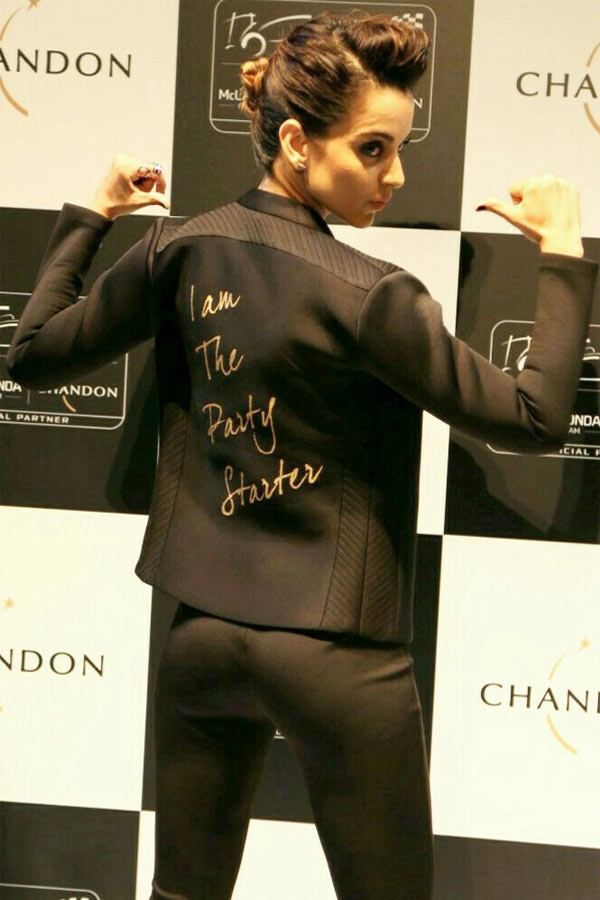
Excerpted with permission from the book In Conversation With The Stars; Published by Rupa
Author Pic/ Photo credit: Film Companion

